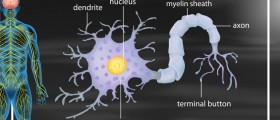
Multiple sclerosis, also known as disseminated sclerosis or encephalomyelitis disseminate, is an inflammatory and often disabling health condition that affects the central nervous system: brain, spinal cord and nerves. Multiple sclerosis is an autoimmune disease in which the body’s immune system attacks the protective layer, called myelin, which covers the nerves. Sometimes the nerve itself may also be damaged. What happens is that damaged myelin or damage nerves interrupt the communication between the brain and the body causing the symptoms of the disease.
Signs and symptoms of multiple sclerosis
The course of the illness depends on various factors and the development of the disease, its severity and full spectrum of the symptoms usually vary from one patient to another. Amount of the damage and nature of the affected nerves govern the nature of the symptoms. This is why it is extremely difficult to diagnose multiple sclerosis in the early stages. Moreover, in the early stages of the disease symptoms may come and disappear again.
The most common symptoms of the disease are extreme fatigue, numbness of the limbs, difficulty to walk, balance and coordinate motion, bladder and bowel dysfunction, problems with vision, dizziness and vertigo, sexual dysfunction, intense pain, loss of cognitive function and problems with memory, emotional changes and mood swings, depression and spasticity.
Other symptoms that occur in small number of patients involve difficulty to speak, problems with swallowing, headaches, problems with hearing, seizures, tremor, problems with breathing, and itching.
The first warning symptoms usually involve unusual pain and numbness in the limbs or in one part of the body. Pain may often be disabling and affect the normal movement. Loss of balance or simple lightheadedness forms another cautionary set of symptoms. Noticeable cognitive changes, resulting from the damage to the nerves, are third most common warning sign. These include problems with memory, calculations, attention, and focus or simple use of language.
If any of the strange symptoms is present, it is important to report to a doctor and talk about the possible causes.
Risk factors
Multiple sclerosis may occur at any age but it is most frequent in women and in patients between the ages of 20 and 40.
People who have a family history of multiple sclerosis are also at a higher risk from developing this condition. Their likelihood for multiple sclerosis is somewhere around 1-3%. The risk in the general population is about 10 to 30 times lower.
Recent studies discovered that one of the possible causes for multiple sclerosis might be a viral infection. There is evidence that connects Epstein-Barr virus, responsible for mononucleosis, with higher rates of multiple sclerosis occurrences.
Other autoimmune diseases such as type 1 diabetes, thyroid disease or inflammatory bowel disease may also put a patient at higher risk of developing multiple sclerosis.












-and-Multiple-Sclerosis-Differences-And-Similarities_f_280x120.jpg)




Your thoughts on this
Loading...